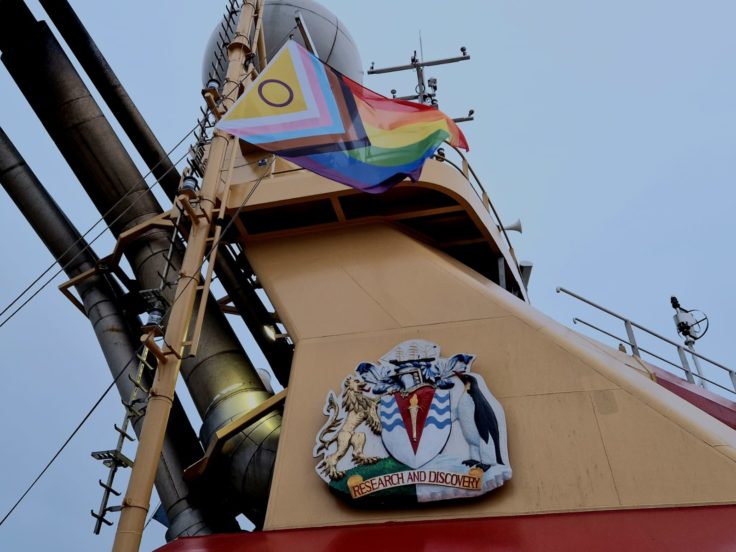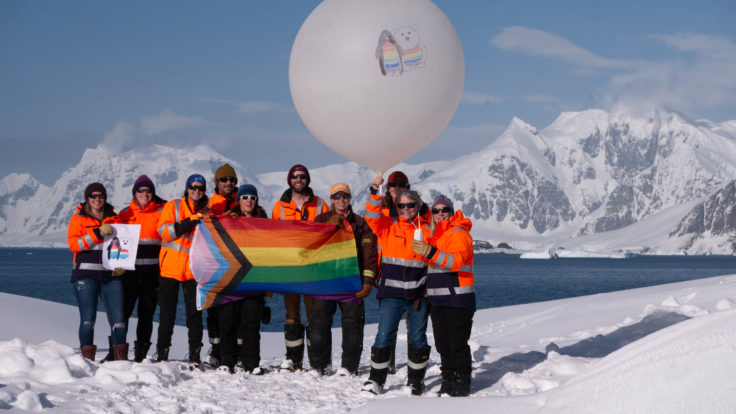Guest blog: Why Pride matters for doing better polar research
15 November, 2023
This is a featured guest blog by Dr James Lea from the University of Liverpool as part of our wider collaborations through the Diversity in UK Polar Science Initiative. The original blog was commissioned and published by the All-Party Parliament Group (APPG) on Polar Regions to mark and celebrate Polar Pride 2023.
Polar research often conjures images of scientists operating in remote, arduous conditions at the ends of the world reminiscent of the likes of Scott, Shackleton and Amundsen during the ‘Heroic Age’ of polar exploration at the turn of the 20th century.
However, 21st century polar research is so much more than this. The interdisciplinary nature of polar research problems require teams that draw on global expertise, increasingly combining understanding of the human, social and physical environments to answer fundamental questions about polar environmental change.
While the diversity of disciplines and approaches in polar research is undoubtedly one of its strengths, its history of being primarily a white, macho area of research continues to resonate today. Minority groups continue to be under-represented, and experience direct and indirect discouragement (or in some cases are effectively excluded) from being able to pursue polar research careers.
Those who identify as LGBTQ+ are one of these under-represented groups, comprising an estimated 2% of polar researchers (1). This is compared to 7.2% of staff in higher education (2), and 3.2% of the national population (3), though both these two figures are likely under-estimates (4). This under-representation arises not only from the nature of polar research and its historical legacy, but also UK and international societal and cultural attitudes. Together, these impact the ability of LGBTQ+ polar researchers being able to live and work openly, do their jobs effectively, and be valued for who they are.
But why does this matter, and why does polar research need Pride?

In a practical sense, polar science depends on teamwork, and it is inarguable that more diverse teams are able to produce better work . However the advantages that are gained from this diversity of thought and experience can only be realised if those who are part of the team can voice this without fear of judgement or recrimination. Polar research is no exception to this, with the nature of the work that can be required as “part of the job” amplifying the importance of an inclusive working environment.
While inclusive working is important for polar research conducted in the office or the lab, its importance (especially for minority groups) is magnified in polar fieldwork settings. Fieldwork frequently involves small groups of researchers operating in close proximity to one another in some of the most remote parts of the planet. This often requires being away from home and support networks for weeks to months, during which time researchers necessarily rely closely on one another for their physical and mental safety and wellbeing.
The nature of polar fieldwork also means that small problems can have potentially major consequences. As a result, should the need arise, team members need to be prepared to potentially share very personal information about themselves with their team where it impacts the safety of themselves or others. Being in an environment where from the start you think you may suffer for being open about who you are, or where you feel unable to talk about your family, relationship and friends can be a fundamental barrier to this.
While I have been lucky to do fieldwork and research alongside inclusive and accepting teams drawn from countries around the world, this is not always the case for all. If those who are LGBTQ+ do not feel safe to be themselves, they may seek to avoid situations that put them at risk (potentially denying themselves opportunities for career progression), and/or go back “into the closet” and hide parts of themselves, their personality and their experiences that could otherwise be of benefit to the team.
However, this issue is also not just relevant for fieldwork.
On a personal level, I have had direct experience of this when I attended a meeting in Moscow in 2018 after Russia’s “Gay Propaganda Laws” had been passed. While I attended the meeting voluntarily, in order to feel safe I made the conscious decision to hide my sexuality from all of those on the trip. This involved hiding aspects of my personality, self-censoring my conversation, locking down my social media profiles, and using a temporary phone that did not have messages from my partner at the time. I thought this would be manageable and make me feel safe.
It did not.
I dramatically underestimated the effect of hiding who I was on both myself and on my work. The experience was physically and mentally exhausting, severely impacted my overall mental health, and led to me being disengaged from the work I was trying to undertake during and after the trip. Outwardly I may have appeared fine, and said I was fine, though I was emphatically not.
This experience confirmed to me that if I cannot be myself as an openly gay man in polar research, I know that me, my work, and the work of others will suffer. Personally, this is why Polar Pride is important to me.

More broadly, the polar research community in the UK and internationally needs Polar Pride so all its members (and those who are informed by it) can benefit from the better research and safer working environments that result from everyone being accepted and valued for who they are. The visibility it affords to LGBTQ+ polar researchers also provides important reassurance to others and those coming through that they are not alone.
Some may argue that efforts to improve this would make polar science “woke” (11). However, if it is woke to improve researcher safety, enhance project outcomes and ensure everybody can do their job effectively, then being woke in polar science benefits researchers and wider society.
While Polar Pride and a variety of other initiatives have contributed to improvements in polar research, it does not exist solely within an ivory tower. The poles are intensively geopolitical spaces, and the attitudes of those who work within it nationally and internationally are inevitably shaped by both society around them and policy of individual governments.
Though the UK has been making progress on this front (12), it is not necessarily the case for all nations who conduct polar research. There remains an imperative to push for the rights of, and responsibilities to LGBTQ+ researchers within international teams. However, that is also not to say that the UK currently provides the best working environment for LGBTQ+ researchers either.
The rise of so-called “culture war” topics related to LGBTQ+ identities and the escalating rhetoric associated with this from media and politicians is having a detrimental impact on the UK’s international reputation for being a safe place to live and work for LGBTQ+ polar researchers (13). This is having tangible impacts: I have received messages from and had conversations with British and international LGBTQ+ researchers based in the UK who are looking to leave the country because of this; allies are warning colleagues against moving here; previously unacceptable workplace behaviour is being emboldened; crime against the LGBTQ+ community is rising making people feel unsafe in the street. Polar research is one of the UK’s research strengths, and culture war discourse is actively damaging to this.
As an initiative that spans international borders within a field of research that has direct impact on the UK and the world, this demonstrates why Polar Pride is still needed. It highlights the benefits to all of the increased visibility and inclusivity of LGBTQ+ researchers within polar research and society at large.
Polar Pride aims to show that researchers, support and logistics staff, policymakers and politicians all have responsibility to foster ever more inclusive research environments. In doing so, this allows everyone (not just LGBTQ+ researchers) to better address the global challenges created by the rapid changes happening at the ends of the earth.
About #PolarPride: Recognising the need to try to enhance representation across the UK Polar community, in 2019 the FCDO instigated the Diversity in Polar Science Initiative, and in 2020 the Governments of the British Antarctic Territory and South Georgia & the South Sandwich Islands declared the first #PolarPride day on 18 November. #PolarPride has grown into an internationally recognised event, to celebrate and support the contribution of the LGBTQ+ community working on Polar matters.
References
(1) 2021 Report for the first stage of the Diversity in PolarScience initiative – bas.ac.uk
(2) Advance HE Equality in higher education: studentstatistical report 2022 – advance-he.ac.uk
(3) Sexual orientation, England and Wales: Census 2021 – gov.uk
(4) The figure for staff in highereducation is only for LGB+ identities and excludes non-responses (43%), while7.5% of respondents refused to disclose. The census figure only includes LGB+identities for England and Wales, and is likely to be an under-representationof the true figure given that 7.5% of census respondents declined to answer thequestion. While data exist for trans and other gender identities (0.4% from [2]and and 0.5% from [3]) these have high non-response rates and can be intersectionalwith LGB+ identities. Consequently, these are not added to the figures quotedto avoid double counting. A proportion of these non-respondents for bothsurveys are likely to identify as LGBTQ+ (see 2021 census: What do we know about the LGBT+ population?; House of Commons Library)
(11) https://x.com/Conservatives/status/1709207218027934071?s=20
(12) Diversity in Polar Science Initiative – bas.ac.uk
(13) Politicians risk exposing Trans people to hate crimes, reveals Home Office– independent.co.uk
(14) Hate crime, England and Wales, 2022 to 2023 – gov.uk
(15) LGBT tolerance ‘going backwards’ as hate crimes up – BBC News
(16) Looking North: The UK and the Arctic. The UnitedKingdom’s Arctic Policy Framework – gov.uk